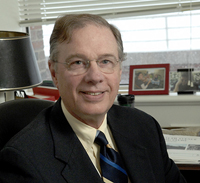A Green Campus Starts Online
New Web site addresses University sustainability issues

Environmental sustainability, the notion that we should live our lives so as to leave the environment in as good — or better — condition as it is today, is often associated with recycling, driving a hybrid vehicle such as a Toyota Prius, and eating organic food. But there is much more that individuals — and institutions like Boston University — can do to promote the concept. A new Web site, www.bu.edu/green/, is intended to inform the BU community about the steps the University is already taking toward environmental sustainability and to let students, faculty, and staff know what they can do to help.
The Web site, which is named “Greening the Campus. Healthy People. Healthy Planet. Healthy BU,” outlines the steps BU is taking toward sustainability in five key areas: energy management and resource conservation, solid waste management, purchasing, transportation, and construction. The site also offers advice about how to reduce water, energy, and other resource consumption, such as switching to compact fluorescent bulbs and turning off computers when not in use.
“The public jumps right to recycling when they think of sustainability,” says Michael Field, the University’s assistant provost, who led the effort to create the new Web site, “but first it’s solid waste management: reduce waste, reuse things when you can, and after you’ve done those things, then recycle. We’re trying to get the first two Rs, reduce and reuse, more understood and practiced in the University community.”
Cutler Cleveland, a College of Arts and Sciences professor of geography and the environment, helped Field create the green campus Web site. He says that he sees a concentrated effort on the part of a growing number of students, faculty, and staff who think that we can and should be doing much better than we are doing.
One of the most cost-effective sustainability measures is a reduction of the amount of energy consumed by the University community. Through measures such as replacing light bulbs with energy-efficient lighting, improving heating and cooling systems, and installing water conservation devices liked timed faucets, the University has cut its annual utility costs by almost 10 percent. In 2006, energy conservation measures enabled BU to save an estimated $3.6 million in utilities costs, reducing energy usage by 11.6 million kilowatts and 719,266 gallons of fuel and saving 78 million gallons of water and sewage, according to figures on the energy management and resource conservation page.
“Six years ago students were after us to have the custodians collect their recycling right in their rooms,” says Field. “We don’t have enough resources to do that, and besides, I want to send the message that it’s an all-hands effort. Our Web site will try to do that by providing information and encouraging people to get on board.”
As part of increasing community involvement in sustainability efforts, Field will launch two initiatives in the near future: the Reusable Office Supply Exchange (ROSE) Program and the Online Yardsale. ROSE will provide an online forum for faculty and staff to post items that their office no longer needs, such as furniture or computers, so that rather than buying something new or doing without, other offices can use them. While ROSE is exclusively for the internal transfer of University-purchased items, the Online Yardsale is like a craigslist.org for the BU community. Any student, staff, or faculty can post items like furniture, electronics, or sports equipment, along with their price and contact information. Campus-wide participation in these initiatives should reduce the amount of waste and recycling.
“For all these things to work, everybody has to do it,” says Field, who recently backed up his words by buying a Prius. “It’s not something that the University as an institution is going to do for its students and staff. If the students and staff aren’t part of the solution, it won’t work.”
Catherine Santore can be reached at csantore@bu.edu.